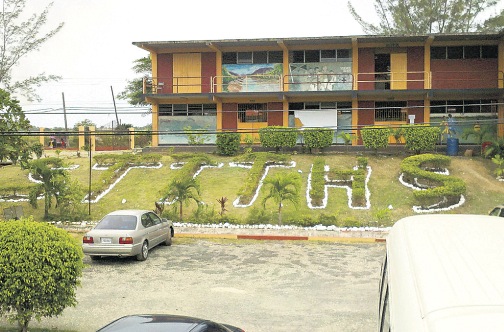As Jamaicans, our team spirit is second to none. We know how to rally when the time comes. If you have had the pleasure of being in the National Stadium to watch a qualifying match with the Reggae Boyz, you know what I am talking about. It is electrifying. We get on bad in the stands. We even tell the coach how to organise the players. Everybody becomes experts.
I want to challenge us as Team Jamaica to harness that energy and passion to treat with education, as we do other areas that are important to us. Many of us need to get out of the stands and participate!
Education evens the score and levels the playing field. It separates productive nations from those that are unproductive. And, every child is entitled to a good education. It is his or her basic right – and it is our duty to get it right!
I am often accused of being impatient; and that I don’t understand that things take time to change. But, the more I visit schools in Jamaica, the more impatient I become, because I am convinced that students don’t have time! All they have is now.
They can’t wait for more resources to be provided or for Parliament to review, amend or pass the next act, policy or regulation; they can’t wait for the next visit by the education officer or for teachers to get higher wages. They can’t wait for a poorly performing principal or teacher to retire in two years. They don’t have time!
Our annual statistics show us we are nowhere near where we ought to be as a country in the development of our students, who are struggling to simply attain passes in maths and English. Fewer than half, or only 49 per cent, of our students passed maths in the 2014 Caribbean Secondary Education Certificate examinations, and more than 40 per cent failed English. Many more did not even have the chance to sit examinations in these basic subjects, but graduated from high school unprepared to transition into the world of work.
In some schools, five out of a cohort of 200 pass maths after five years in high school! And too often the heads of the Maths Department in some schools have never passed the subject themselves. It is as if we are at half-time in a
football game and we now have to make some critical and tactical decisions if we want to get some goals in the back of that net. Only goals win games!
Therefore, we need to redefine and build a clear rationale to educate the people we serve. We need to ask ourselves, “Who are we serving and what are we preparing them for? Sadly, when I go into classrooms, I, too, often see students seated in neat rows being fed the same diet in class after class.
We need an injection of disruptive innovation in our system; and, this requires a Team Jamaica effort, because education is a team sport. There are some great things happening in schools and classrooms across this country, but in too many places, there is a one-size-fits-all approach. How then do we expect to achieve creativity and innovation?
Our education sector faces resource challenges, as there is simply not enough, especially in our rural schools, but I have seen leaders who inspire creativity, manage strategically and, as we say in Jamaica, ‘tun dem han mek fashion’, to support success in the most underserved schools.
Research the world over tells us that the two biggest contributors to the success of schools are the quality of leadership and the quality of teaching and learning.
According to the National Education Inspectorate, after inspecting 85 per cent of schools, leadership is satisfactory in only about 46 per cent of our schools, which really means leadership is merely meeting the minimum standards; while in 40 per cent of our schools, leadership is unsatisfactory, and THREE per cent are in need of critical support.
This is why my organisation, Jamaica National, has partnered with the Ministry of Education to support their efforts to improve the leadership in schools. We did this under the five-year Centres of Excellence Programme, which was created and funded jointly by JNBS and VMBS in six rural high schools across Jamaica, and we continue to do so under the iLead programme, being implemented by the JN Foundation and the Ministry of Education, in schools in the parishes of Portland, St Thomas and St Mary.
The JN Foundation supports the leadership, school boards, education officers, principals, middle leaders and student leaders in these schools to shore up their systems of management and accountability; clearly define their visions and goals; set targets, and, most important, we provide coaching, mentorship and collaboration at all levels.
This is a mere drop in the bucket, but already there are ripples. So far, we have touched the lives of approximately 10,000 students, 700 teachers, and 100 leaders. A school like Green Pond High School, which is in a very volatile community here in Montego Bay, is not the same place today, having gone through our programme. School leaders there have opted to do things differently and are challenging their students and themselves to achieve better results … and THEY HAVE!
We have to remove the labels and eliminate that dangerous single story that says schools which are called ‘non-traditional’ cannot succeed. ALL SCHOOLS MUST BE GOOD SCHOOLS and be staffed with the school leaders who can manage various learning capacities and student challenges, and who can create the environment where value can be added despite the level at which the school receives the student. Now, more than ever in our history, we need a soundly educated workforce to take us in the direction we wish to go as a country.
Our classrooms are like football fields in many ways. There is plenty of talent waiting to be unearthed, and our school leaders are the captains, coaches and technical directors who must tap into students’ potential. Schools must become the centres of innovation in our country if we want an innovative workforce.
We need school leaders who:
*Challenge the status quo.
*Use data to inform what they do; and not simply rely on ‘feelings’.
*Collaborate and work closely with all stakeholders and form meaningful partnerships.
*Take responsibility for every student’s performance.
*Create a culture of success by setting high expectations for all students.
*Develop the environment in which children learn by discovery, and appreciate that mistakes are part of the process of knowledge building.
It’s urgent that we no longer see ourselves as spectators. We have a part to play in creating futures with positive outcomes that will, in the final analysis, benefit all of us.
– Dr Renee Rattray is director, education programmes, JN Foundation. Email feedback to columns@gleanerjm.com.
http://jamaica-gleaner.com/article/focus/20150621/education-team-sport













